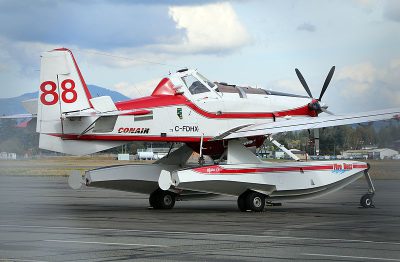
A well-trained and prepared pilot were fundamental to the positive outcome of an aerial tanker crash in B.C. in 2022. In its final report on the accident, the Transportation Safety Board said the pilot of the Conair Air Tractor AT-402 Fire Boss tanker had only 40 seconds to act between the time his engine quit and he hit the trees on a mountainside near Cranbrook. “The investigation also determined that the pilot’s decision making, experience, and recent training assisted in a successful outcome,” the report said. “Additionally, the pilot’s use of a flight helmet, the 5-point harness, windscreen design, and slow impact speed all reduced his injuries.”
The pilot was working a fire on Connell Ridge, south of Cranbrook, when the plane lost power. He was at 350 feet and picked a clearcut as a landing site. The plane was on amphibious floats. “Firefighting aircraft must operate at low altitudes to fight forest fires effectively,” the report said. “At such low levels, recovery from an aircraft malfunction becomes extremely challenging. In such a situation, a pilot’s decision making and reaction time are critical for a successful outcome.” Since the accident, Conair has added simulator training for this kind of scenario to the overall training program for its single-engine air tanker pilots.
